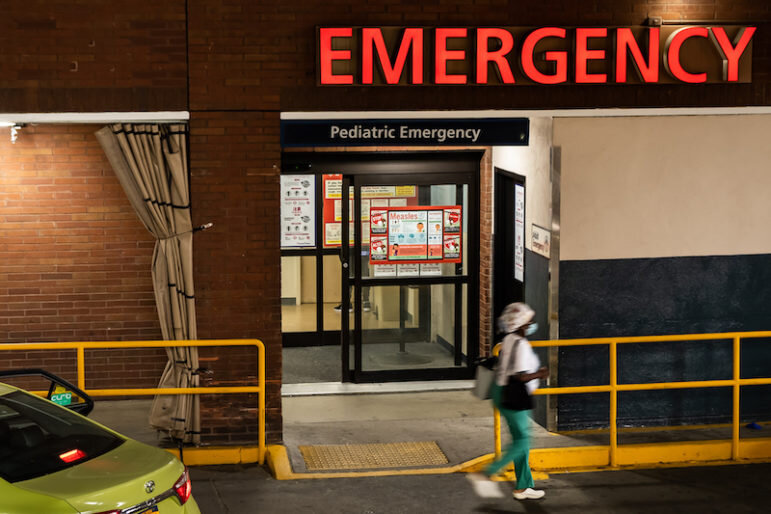Patients Struggle to Navigate the Split Between Insurers and Hospitals
Montefiore Medical Center’s Moses Campus on Bainbridge Avenue In the Bronx in October.
The impasse between United Healthcare and Montefiore Hospital has put pressure on consumers and employers to figure out how to maintain access to trusted doctors amid a public-health crisis.
[Ed. - this is another example of why NYPAN strongly backs passage of the New York Health Act]
Nearly six months since a major New York City hospital system and a powerful insurer severed their relationship, some of the tens of thousands of affected patients are still scrambling to deal with the fallout.
Several Bronx nonprofits are reeling from the change and state officials seem to have taken little action to push for a compromise.
United Healthcare (UHC) announced on Jan. 1 that physicians and facilities affiliated with the Montefiore hospital system were no longer part of its network after the two sides couldn’t agree on a menu of reimbursement costs. UHC claimed that Montefiore was asking for exorbitant cost increases, while Montefiore alleged that UHC was improperly using its market power to increase profits.
The impasse affected some 60,000 patients and their employers. The latter list included prominent Bronx nonprofits like Fordham Bedford Housing Corporation, Northwest Bronx Community and Clergy Coalition, University Neighborhood Housing Program, Concourse House and Part of the Solution (POTS).
A dispute over cost
Both companies are major players in their respective industries. United Healthcare is one of the largest health insurance companies in the country—by some measures, it is #1 in market capitalization and #3 in market share—with revenues of $257 billion in 2020 and just under 40 million customers worldwide. Along with Mount Sinai and New York-Presbyterian, Montefiore is considered one of the “big three” hospital chains in the New York City area, with 10 hospitals, a nursing school, a medical school and 200 other facilities spread across the Bronx, Westchester County and the Hudson Valley.
UHC blames the dispute on Montefiore, which it claims is already the most expensive hospital in the area. “Our latest proposal to Montefiore would provide a significant increase to the health system’s prior reimbursement rates, which were already the highest in all of New York City. Unfortunately, Montefiore is now demanding price hikes of 43 percent over the next five years for its hospitals and physicians, which would drive up health care costs by $434 million,” a UHC spokesperson told City Limits.
“Our most recent offer remains on the table for Montefiore to sign and we ask that they accept our proposal rather than continuing their demands for egregious price hikes that are not affordable for the New York residents and employers we serve,” the spokesperson continued.
Montefiore disputes that version of the story. The hospital says UHC ignored Montefiore’s offers to negotiate for two months last summer. Montefiore says it has asked only for single-digit, year-to-year increases in reimbursement costs, although it couldn’t share documentation to that effect.
“United won’t agree to rate increases that are lower than the ones they agreed to in 2018; a time before the pandemic, before hospitals and communities suffered the unprecedented health and economic challenges we are seeing today, and a time before United made the record profits they are seeing today,” says a Montefiore spokesperson.
“United’s claims about our rate increases are simply fiction. In reality, we have only ever asked for single digit annual increases consistent with rates paid by every other national insurer,” the spokesperson continued. “We can’t force United to change its mind, but we can help patients find a path to preserve their relationships with their doctors without United—and that’s what we’re doing.”
UHC has had similar disputes with other medical providers around the country. The insurer broke ties late last year with CaroMont Regional Medical Center in North Carolina. In January, the company ended its relationship with Envision, a hospital chain active in 45 states. The following month, the American Hospital Association asked the federal Centers for Medicare & Medicaid Services to intervene to stop UHC from changing its approach to paying for lab services. And U.S. Anesthesia Partners, a national medical practice, sued UHC last month in two states alleging that the insurer is trying to crush the practice “like a boa constrictor” by driving business toward medical practices that UHC owns through its Optum subsidiary.
Patients left scrambling
Some employers had only recently renewed their enrollment with United Healthcare when the break with Montefiore was announced. Among these were Fordham Bedford Housing Corporation, Fordham Bedford Community Services, Concourse House and the University Neighborhood Housing Program, all key players in the Bronx affordable housing and social services sectors who have been UHC customers for years.
“When we renewed our contract with UHC on September 1, 2020, we were unaware that Montefiore’s network contract was expiring on December 31, 2020. We received notification from UHC about a month before the end of the year that the contract was endangered. When the contract was not renewed, we received word from UHC in January,” the leaders of those four organizations wrote to the state Department of Health earlier this month. “In the midst of the pandemic, many people’s long-term relationships with their doctors were disrupted.”
Rosanna Viera, Fordham Bedford Housing’s director of development, was one of those people. She’s been with the organization since 1999 and has had Oxford insurance, which is offered by United Healthcare, all that time. In early January she was diagnosed with COVID-19. “I tried to call and set up just a phone consultation with my doctor and when they realized that I had United [the receptionist] said, “Oh the doctor can’t speak with you. Oh, the doctor won’t be able to consult with you,’” she says.
“I was a nervous wreck. I wanted to speak to a professional, you know?” she said. “So that was a little disappointing.”

